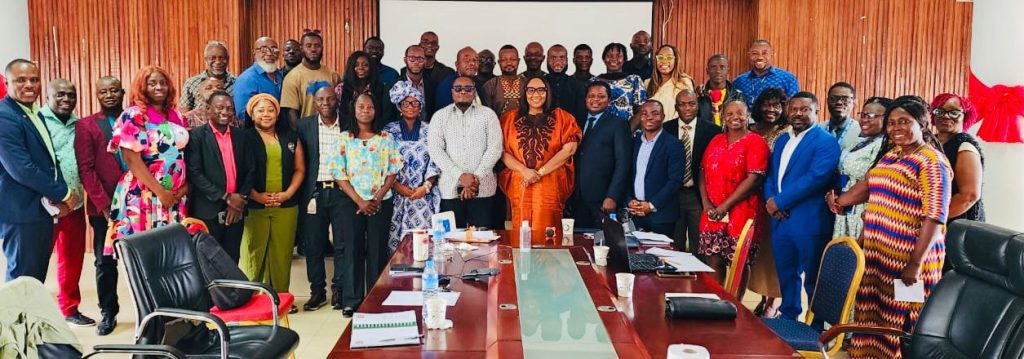Liberia’s Multi-Sectoral Committee on Drugs and Substance Abuse convened a two-day strategic session in Monrovia to bolster the nation’s efforts against the escalating drug crisis. The session aimed to create a unified and actionable strategy encompassing stronger enforcement, rehabilitation, and preventative measures. Stakeholders from government ministries, security agencies, development partners, and civil society organizations gathered to review progress under the National Drug and Substance Abuse Program (NADSAP) and strengthen interagency coordination, highlighting the collaborative nature of this national endeavor.
The Minister of Health, Dr. Louise Mapleh Kpoto, who also chairs the Multi-Sectoral Committee, underscored the government’s commitment to a comprehensive, society-wide response. She emphasized that the session was not merely for discussion, but for concrete decision-making and action. The goal was to develop a clear roadmap, translating commitments into tangible interventions across all sectors. Recognizing the severity of the situation, Dr. Kpoto stressed that combating substance abuse is a continuous, urgent national priority requiring consistent action, accountability, and collaboration from all stakeholders.
During the session, Dr. Moses Ziah II, Director of the Mental Health Unit at the Ministry of Health, presented a progress report detailing the committee’s achievements. The report encompassed enforcement actions undertaken by the Liberia Drug Enforcement Agency (LDEA), community-based rehabilitation initiatives, vocational training programs for recovering users, and policy reforms driven by the Ministry of Justice and associated agencies. This presentation provided a comprehensive overview of the multi-pronged approach employed in tackling the drug crisis.
Key outcomes of the session included the formation of a dedicated Technical Working Group (TWG) and the endorsement of a series of critical recommendations. These recommendations encompassed escalating law enforcement operations to curb drug trafficking and distribution, expanding rehabilitation and treatment services nationwide to provide support for those struggling with addiction, and accelerating prevention programs in schools, communities, and workplaces to raise awareness and prevent future substance abuse. This reflects a comprehensive strategy addressing both the supply and demand sides of the drug problem.
Furthermore, the session prioritized two crucial aspects: resource mobilization and the implementation of the national drug information system. Securing adequate resources is essential to fund the various initiatives, ensuring the long-term sustainability of the program. The operationalization of the national drug information system will allow for better tracking of drug usage trends, providing valuable data to inform policy decisions and interventions. This data-driven approach is crucial for effective resource allocation and program evaluation.
International partners, including the UN system, YWCA, and Mother of Light Rehabilitation Center, pledged their ongoing support through technical assistance, funding, and capacity-building initiatives. This international collaboration strengthens Liberia’s efforts, providing expertise and resources to support the implementation of the national strategy. The combined efforts of national stakeholders and international partners demonstrate a united front against the pervasive issue of drug and substance abuse in Liberia. This collaborative approach underscores the recognition that tackling this complex challenge requires a multi-faceted strategy and sustained commitment from all involved parties.
The strategic session serves as a crucial step in consolidating Liberia’s fight against drug and substance abuse. By bringing together diverse stakeholders, reviewing progress, and formulating concrete recommendations, the session has laid the groundwork for intensified action. The focus on enforcement, rehabilitation, and prevention, coupled with the commitment to resource mobilization and data-driven decision-making, underscores a comprehensive approach to address this pressing national issue. With the support of international partners, Liberia is striving to create a healthier and more productive future for its citizens, free from the devastating consequences of drug and substance abuse. The two-day session signifies a renewed commitment to tackling this challenge and fostering a collaborative approach involving all sectors of society.
The scale of the challenge requires ongoing efforts and vigilance. The success of the outlined strategies hinges on the sustained commitment of all stakeholders, effective interagency coordination, and the continued support of international partners. The strategic session provides a framework for moving forward, but the true measure of its impact will be seen in the implementation of the recommendations and the tangible improvements in the lives of those affected by drug and substance abuse. It is crucial that these commitments translate into concrete actions, and that progress is continuously monitored and evaluated to ensure the effectiveness of the interventions. Furthermore, adapting the strategies to the evolving nature of the drug landscape will be crucial for long-term success.
Beyond immediate interventions, addressing the root causes of drug abuse – such as poverty, unemployment, and lack of access to education and healthcare – is crucial for sustainable solutions. Investing in preventative measures, particularly targeting vulnerable youth, will help to break the cycle of addiction and build a more resilient society. This holistic approach, encompassing both immediate action and long-term preventative measures, is essential to effectively address the complex challenge of drug and substance abuse in Liberia. The government, along with its partners, must continue to advocate for and invest in these initiatives to build a brighter future for the nation.
The success of Liberia’s fight against substance abuse hinges not only on strong enforcement and effective rehabilitation programs, but also on fostering a supportive environment for individuals recovering from addiction. Integrating them back into society through vocational training and employment opportunities is crucial for their long-term recovery and well-being. This requires addressing the stigma associated with addiction and promoting understanding and acceptance within communities. Creating a society that embraces and supports those struggling with addiction is vital to achieving lasting change.
Finally, the strategic session exemplified the power of collective action. By bringing together diverse stakeholders with shared goals, the session fostered a sense of shared responsibility and created a platform for collaboration. This collaborative spirit is essential for sustaining the momentum in the fight against drug and substance abuse. Moving forward, maintaining open communication, sharing best practices, and learning from each other will be crucial to achieving lasting results. The fight against substance abuse is a marathon, not a sprint, and requires ongoing commitment, adaptation, and collaboration from all involved.


